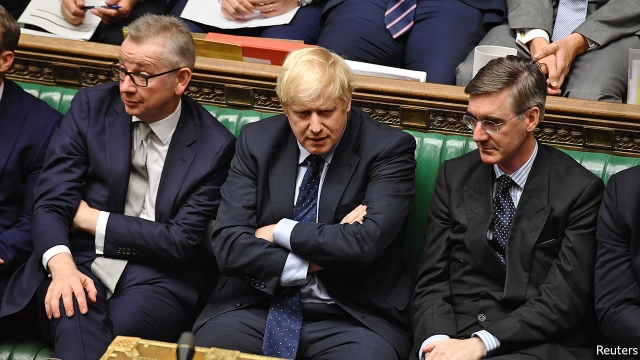MPs’ vote to take control of the agenda was but a first step. A day later they voted through all its Commons stages the so-called Benn-Burt bill seeking to stop Britain leaving the EU without a deal. The bill provides that, if the prime minister has not done a deal with the EU by October 19th, he must seek an extension of the October 31st deadline, initially to January 31st 2020. As we went to press it was moving to the Lords, where the government appeared to be willing to let it pass. Most observers now expect Benn-Burt to become law by early next week.
Mr Johnson and his advisers have shown a little feel for how to handle the Commons. The prime minister barely even tried to answer questions from Jeremy Corbyn, the Labour leader, and other mps about his Brexit strategy. Instead, he blustered that what he dubbed “Corbyn’s surrender bill” would undercut his negotiating position, making it impossible to win concessions in Brussels. This claim was disbelieved by opponents, including many Tories, who say no negotiations are happening, partly because Mr Johnson has made no clear proposals to replace the backstop to avert a hard border in Ireland.
If the tactic of threatening no-deal to lever concessions out of the EU has failed, so have attempted to bully MPs. Mr Johnson’s high-handed suspension of Parliament from September 9th for almost five weeks was followed by threats to reimpose discipline lost under Theresa May by deselecting Tory MPs who defied the whip (which Mr Johnson himself did twice earlier this year). Yet the effect was just to strengthen the rebels. In April Mrs May lost an earlier version of the Benn-Burt bill by just one vote, compared with Mr Johnson’s 27.
Mr Johnson responded to his defeat with characteristic belligerence. Although he conceded that he was bound to observe the law, he also said there were no circumstances in which he would ask for an extension of the October 31st deadline. The solution, he suggested, was to hold an election before then, to let the people decide who should be negotiating with the EU. He let it be known that October 15th was his preferred date.
His problem is that, under the Fixed-term Parliaments Act (FTPA) of 2011, prime ministers can no longer call an election when they want. Doing so needs a two-thirds majority of MPs, so Mr Johnson requires Labour support. Although Mr Corbyn has long called for an election, he now insists the Benn-Burt bill stop no-deal must become law first. Late on September 4th, a motion by Mr Johnson calling for an election duly failed because it passed with too small a majority. There are ways around the FTPA, however. A one-sentence motion calling for an election despite the act might get a simple majority. Or Mr Johnson could engineer defeat via a vote of no confidence. With his majority shot, an election seems to become. Can he win it?
Here Mr Johnson is bullish. The latest polls give the Tories a ten-point lead over Labour. Yet elections go wrong, as Mrs May found when squandering an even bigger lead in 2017. Without a pact with Nigel Farage’s Brexit Party, which may be hard to agree, it could take Tory votes. The Tories may lose seats in Scotland, London and the south. To win a majority, they must make big gains in the midlands and north. These regions have many pro-Brexit voters, but they are by instinct anti-Tory. An election could be harder for Mr Johnson to win than some of his advisers think.
Read the original article on The Economist.
More about: BorisJohnson
















































